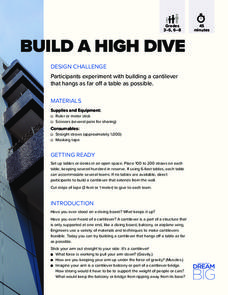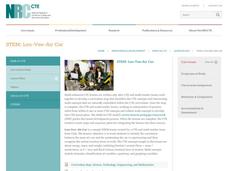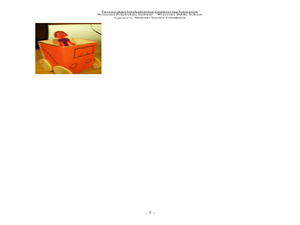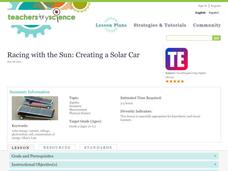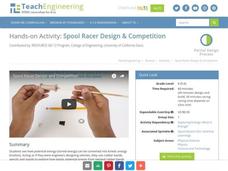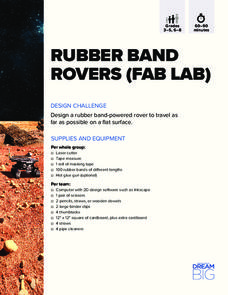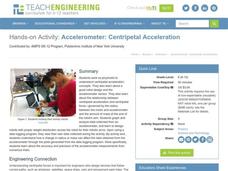DiscoverE
Build a High Dive
Can't build a cantilever? You'll be able to after a hands-on, constructive activity. Young engineers build cantilevers out of straws and tape. The finished products must be able to hang off a table as far as possible.
PBS
Rubber Band Car
Class, start your engines. Future engineers design a car with old CDs as wheels. The power source? Some rubber bands will do the trick! This is the first installment of a five-part series.
National Research Center for Career and Technical Education
STEM: Lou-Vee Air Car
A comprehensive lesson on acceleration awaits your physicists and engineers! Two YouTube videos pique their interest, then sample F=ma problems are worked and graphed. The highlight of the lesson is the building of a Lou-Vee air car!...
Curated OER
Building a Car: Mechanical Engineering
Students use common materials to build a car. In this car building mechanical engineering lesson, students build a car using a milk cartoon and plastic wheels. They discuss what mechanical engineers do and what makes a car run.
Teach Engineering
Racing With the Sun - Creating a Solar Car
Here's an exciting and innovative lesson that's sure to get your charges fired up! In it, they use engineering design principles to construct and test a fully solar powered car. One caveat: the kits that each group needs to make their...
Cornell University
Bridge Building
Bridge the gaps in your knowledge of bridges. Individuals learn about bridge types by building models. The activity introduces beam bridges, arch bridges, truss bridges, and suspension bridges.
Mascil Project
Design and Build Your Own Vacuum Cleaner, Hair Dryer or Toy Car
No vacuum cleaner? No problem, just build your own. Scholars apply knowledge of currents to build a model of either a vacuum clear, a hair dryer, or a toy car. While the class completes the activity, instructors consider gender...
National Science Teachers Association
Paper Car Crash Design
High school physical scientists collide with motion. They work in pairs to design a paper car that will protect a raw egg during a head-on collision. Measurements of distance traveled, time of run, vehicle specs, and photo gate flags are...
Curated OER
Design and Build Lego Cars
Students build cars out of legos. In this building lesson plan, students can also use Lego Mindstorms robotic equipment to add engines.
Museum of Science
Balloon Racers
Watch those balloon cars go! Scholars build racers that run using the power of balloons and conduct races with the cars. They learn about Newton's third law of motion and how it applies to their balloon racers.
Curated OER
Fuel Cell Experimentation
With rising oil prices and increasing concerns over global warming, the pressure is on for engineers to develop alternative sources of energy. Among the new technologies being developed are hydrogen fuel cells, which young scientists...
Teach Engineering
Spool Racer Design and Competition
Wind it up and let it go. Individuals build a basic spool racer in the second portion of a six-part unit on energy. After receiving three criteria, pupils modify their designs to meet the new challenge. Pairs compete against each other...
Curated OER
Building A Sturdy Car
Students build a sturdy Lego car using a motor and a pulley. They determine how sturdy the car is by dropping it from the height of the teacher's knee.
Curated OER
TE Activity: Racing with the Sun - Creating a Solar Car
Students use a purchased kit to build a solar powered car. They connect a solar photovoltaic panel to a motor which runs the car forward and backward. They determine how to wire the car to move in both directions.
Rochester Institute of Technology
Molecules and Fuel Cell Technology
A fuel cell is where the jailer keeps gas guzzlers. Scholars review chemical reactions, chemical bonds, and chemical structure in order to apply these concepts. Participants construct fuel cell kits, using electrolysis to run the car and...
Perkins School for the Blind
Safety Crash Testing
Everyone knows that cars have safety features, but wouldn't it be fun to design your own? Learners with visual impairments build a ramp and then attempt to use the material provided to design a safety system to protect a raw egg from a...
DiscoverE
Puff Mobiles
You've probably heard of solar-powered cars, but what about wind-powered cars? Scholars build cars that can travel at least six feet. They can only use their breath to move the car—so, obviously, a sail might be a good feature for the...
Institute of Electrical and Electronics Engineers
Wind Tunnel Testing
One of the factors that automotive engineers must consider is wind drag. The less wind drag, the more efficient the car will be. They perform many tests in wind tunnels, then refine their designs and test again. Using simple materials,...
Cornell University
The Physics of Bridges
Stability is key when building a bridge. Scholars explore the forces acting upon bridges through an analysis of Newton's Laws and Hooke's Law. The activity asks individuals to apply their learning by building a bridge of their own.
Kenan Fellows
The Newton Challenge
Make Newton proud. Scholars apply their understanding of forces and energy to an engineering design challenge. They learn about simple machines, create a presentation on Newton's laws, and develop a balloon-powered car.
DiscoverE
Rubber Band Rovers
Get your learners interested in space exploration. Groups design space rovers using design software and then build prototypes of their designs. The farther the rovers can travel, the better. The catch? The rovers must be powered by...
Teach Engineering
A Simple Solution for the Circus
Class members are challenged to design a device that will move a circus elephant into a train car. Groups brainstorm ideas that use simple machines to load the elephant. They then choose one of their ideas, sketch a plan, and present it...
Teach Engineering
Accelerometer: Centripetal Acceleration
Scholars build robotic arms that swing back and forth and use them to collect velocity and acceleration data. To analyze the results, pupils compare data to the equations for angular velocity and centripetal acceleration.
Discovery Education
Artificial Intelligence
What makes human interaction different from interaction with computers? Learners consider the question as they build Turing tests to determine whether a computer thinks like a human. They begin by looking at current versions of Turing...


